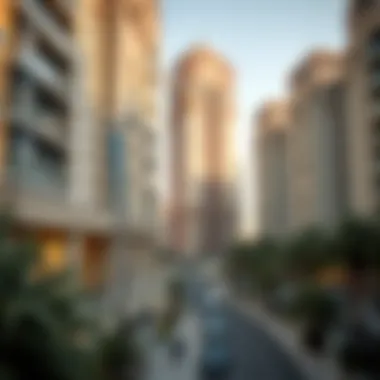Cost of Living Analysis in Dubai: Key Insights


Intro
Dubai has rapidly evolved into a global hub, attracting individuals from all corners of the world. The vibrant atmosphere, coupled with luxurious lifestyles and promising business opportunities, draws many expats and investors alike. However, with the allure of this glittering city comes the pressing matter of understanding the cost of living.
For those contemplating a move to Dubai or even those who are already settled but want to reassess their finances, it's crucial to pin down exactly what living within the city entails. This article dives deep into a plethora of factors that cumulatively shape the cost structure in Dubai, spanning from housing and utilities all the way to transportation, food, and healthcare. We'll juxtapose these essential components against other major cities, offering clarity on how Dubai stacks up in the global arena.
Understanding these dynamics is not just about crunching numbers; it’s about grasping the lifestyle implications that come with living in a city characterized by rapid growth and transformation. Furthermore, we'll navigate through the current market trends and investment opportunities, providing invaluable insights for potential property buyers, seasoned investors, as well as expatriates.
With a clear focus on economical comprehension and strategic planning, this guide strives to equip readers—whether they be investors, homebuyers, or expatriates—with the knowledge necessary to make educated decisions in this bustling metropolis.
As we embark on this analysis, let’s first examine the current market trends that are reshaping the landscape of Dubai's cost of living.
Overview of Cost of Living in Dubai
Understanding the cost of living in Dubai is crucial for anyone considering a move to this vibrant city. It offers a bustling economic landscape and a lifestyle that attracts expatriates and investors alike. As one of the fastest-growing cities in the world, Dubai has unique characteristics that impact various facets of life, from housing to daily expenses.
This overview elucidates the critical elements influencing costs around the city, enabling prospective residents to form realistic expectations.
Living costs can vary significantly—not just from country to country, but even within cities. This makes a detailed analysis of spending vital for both newcomers and seasoned residents looking to reassess their budgets.
In particular, understanding how Dubai fits into the global economic matrix can inform choices about employment, education, and overall lifestyle. By diving into various components of living expenses, this guide assists readers in making informed decisions, whether they are seeking to rent, purchase property, or simply live comfortably within their means.
"The better informed you are about living costs, the more empowered you become in your financial planning."
Understanding Dubai's Economic Landscape
Dubai’s economy is a melting pot, mixing traditional sectors like trade and tourism with rapidly growing high-tech and financial industries. This diversity has created a solid job market that attracts talent from all corners of the globe. Understanding this economic backdrop helps to grasp why costs fluctuate.
From the famed Burj Khalifa to sprawling retail malls, the physical environment reflects a constantly evolving economy. The Emirate benefits greatly from oil reserves but has been diversifying into finance, tourism, and technology, ushering in a unique economic climate.
Whether you’re an investor eyeing potential in the real estate market or a homebuyer weighing your options, familiarity with the economic landscape is vital. Considerations include:
- Employment Opportunities: Many multinational companies have established their bases here, fueling job creation.
- Real Estate Dynamics: Prices can greatly vary, influenced by demand in luxury versus budget-friendly sectors.
- Consumer Behavior: Awareness of how expats and locals spend can help you gauge the market.
Key Factors Influencing Living Costs
Several factors play into the day-to-day expenses of living in Dubai. It goes beyond just numbers on a page—understanding these nuances provides clarity. Here are key elements:
- Housing Availability: The variety of available housing options directly affects rental and purchase prices. Luxury districts command higher prices, while budget-friendly neighborhoods cater to different demographics.
- Government Policies: Regulations around foreign investments, taxation, and visa requirements can influence who can live and work in the city. Changes in policy can lead to shifts in market dynamics.
- Cultural Norms: The lifestyle in Dubai, rich in cultural offerings and events, can drive demand for various goods and services.
- Currency Strength: Fluctuations in the value of the UAE Dirham against other currencies can affect purchasing power and living costs for expatriates.
By comprehensively understanding these factors, residents and prospective movers can better strategize their finances, whether managing education expenses, healthcare costs, or planning for leisure and entertainment. The blend of modernity and tradition in Dubai reflects the complexities of managing one’s budget in this unique urban environment.
Housing Costs
Housing costs represent a significant aspect of the overall cost of living in Dubai. With a rapidly growing population and a premium market for real estate, understanding this element is vital for anyone considering moving to or investing in the Emirate. Housing sets the stage for other expenses—like utilities and groceries—making it essential to gauge the options and their implications.
Types of Housing Available
Dubai's housing landscape is diverse, catering to various lifestyles and budgets. From luxurious villas to compact apartments, the choices are plenty. The housing types can generally be classified into three categories: luxury properties, mid-range homes, and budget options. This variety allows residents to find accommodations that suit their financial capacity and lifestyle preferences.
Rental Prices in Different Areas
Renting a home in Dubai is influenced by the area’s reputation and amenities. Prices can fluctuate widely between the most prestigious locales and more budget-friendly neighborhoods. Here’s a closer look at the distinct rental tiers available:
Luxury Districts
Luxury districts in Dubai, such as Dubai Marina or Palm Jumeirah, encapsulate opulence. These areas attract high-net-worth individuals seeking lavish living conditions. The rental rates here often soar beyond the typical budget—unit prices can range from AED 10,000 to AED 25,000 per month for apartments.
One key characteristic of these luxurious districts is their stunning waterfront views and proximity to upscale dining and shopping. While they provide an unparalleled lifestyle filled with convenience, the downside of such high costs is the strain on the overall living budget, particularly for expats or first-time renters.
Mid-Range Neighborhoods
Mid-range neighborhoods like Jumeirah Village Circle (JVC) or Al Barsha offer a solid balance of quality and affordability. These zones typically see rental prices from AED 4,000 to AED 8,000 monthly. They provide access to essential amenities, transportation, and community parks.
This makes them popular choices for families and professionals. The unique feature of mid-range neighborhoods is their community vibe and availability of schools and healthcare facilities, presenting an inviting environment without the extravagant price tags of luxury districts.
Budget-Friendly Options
For those tight on budget, options such as International City or Dubai Sports City present inexpensive housing alternatives. Rental prices in these areas can be as low as AED 2,500 to AED 5,000 per month. While these homes might not have the same allure as luxury accommodations, they offer practicality and a reasonable standard of living.
A distinct advantage is their close-knit communities, although potential downsides include longer commuting times to central business districts and fewer recreational facilities.
Property Buying Trends
The property buying scene in Dubai is influenced by both local and international investors. Many look to purchase homes as an investment, capitalizing on the rising real estate values. Key trends include a growing interest in off-plan properties, while established neighborhoods continue to appeal due to their potential after completion.


The buying process generally involves fees such as the Dubai Land Department registration and the real estate agency commission, which can impact overall affordability. Given the phenomenon of fluctuating market prices, potential buyers must remain vigilant and informed to make sound financial choices.
For more insights, check sources like Dubai Land Department or Property Finder to stay updated on market trends.
Utility Costs
Understanding utility costs is crucial for anyone contemplating life in Dubai. These expenses can have a snug hold on a budget, often sneaking up on residents and expats alike. The functionality of everyday life—lighting, heating, cooling, and connectivity—depends on reliable utility services. Accounting for these costs can make a significant difference in managing one's finances while residing in this dynamic city. Thus, navigating through the landscape of utility costs becomes an essential part of financial planning.
Electricity and Water Expenses
Electricity and water expenses form a significant chunk of monthly utility bills in Dubai. With the soaring temperatures for much of the year, air conditioning is more of a necessity than a luxury, driving up electricity consumption. The local authorities, like the Dubai Electricity and Water Authority (DEWA), enforce a tiered pricing system which means the more you consume, the higher the per-unit cost.
- Average Electricity Costs: On average, households might find themselves paying around AED 400 to AED 800 monthly, depending on usage. A savvy resident would keep an eye on energy-consuming appliances, opting for energy-efficient models to mitigate costs.
- Water Charges: Water expenses can vary widely too. The typical bill might range from AED 150 to AED 300. Water in Dubai is desalinated, and thus can be pricier than what you might expect elsewhere. Since the city relies on technology for its water supply, residents are encouraged to be conscious about their usage—every drop saved helps to keep costs down.
Staying mindful of your electricity and water bills can pave the way to smart financial choices. Small adjustments, like limiting the use of air conditioning during peak hours, can prove beneficial in the long run.
Internet and Mobile Services
In today's digital age, staying connected is paramount, making the costs associated with internet and mobile services just as important. In Dubai, internet providers offer a range of packages, from basic plans suitable for light browsing to premium options catering to gamers and heavy streamers.
- Internet Costs: Basic internet packages start around AED 300 per month for decent speed and service, while premium plans can soar to AED 1,000 or more. The market is competitive, with companies like Etisalat and du vying for customers. This competition can lead to promotional offers that savvy consumers should look out for.
- Mobile Services: Mobile plans also present their own array of choices—prepaid, postpaid, and bundled offers that mix talk time, data, and SMS. On average, a resident might shell out AED 150 to AED 300 monthly for a comprehensive plan. Notably, both Etisalat and du have loosened restrictions on international calls, providing more bang for your buck if you need to communicate with family back home.
With the right selection and understanding of these service costs, one can maintain connectivity without feeling squeezed financially. Staying informed about the latest offers can save you a pretty penny while ensuring you’re always in touch.
Staying ahead of utility costs is not just about being number-savvy; it’s about creating an achievable lifestyle balance in a city that is constantly buzzing with opportunities.
For more detailed information on utility expenses in the UAE, you can check out resources like DEWA or general economic insights from Wikipedia.
Understanding these costs will provide a more comprehensive perspective as you journey through life in Dubai.
Transportation Costs
Transportation plays an essential role in the overall cost of living, especially in a bustling metropolis like Dubai. Depending on the way residents choose to navigate the city, transportation expenses can significantly vary. Understanding the different options and their associated costs is crucial for anyone looking to establish a life here. Regular commuters, occasional travelers, and new arrivals alike must consider the most efficient and economical transportation methods that meet their needs.
Public Transport Options
Dubai offers a well-developed network of public transport that caters to various budgets. The most popular mode for many is the Dubai Metro, which boasts an efficient, air-conditioned service connecting major landmarks, neighborhoods, and shopping centers across the city. The metro’s cleanliness and reliability are often lauded, making it a comfortable choice for many folks.
In addition to the metro, the Roads and Transport Authority (RTA) operates buses and water taxis, giving more flexibility to those relying on public conveyance. Fares are quite affordable with options to purchase daily or monthly passes that can lead to savings for frequent users. Moreover, the RTA has introduced innovative transport options like the mass transit system known as the Dubai Tram, which links between the metro and the main areas of interest.
The public transportation system in Dubai not only reduces daily expenses but also minimizes traffic congestion, offering a sustainable option for the environmentally conscious. For expatriates and locals alike, getting around on public transport seamlessly blends with Dubai’s cosmopolitan lifestyle.
Private Vehicle Ownership Costs
Owning a vehicle in Dubai also comes with its set of costs, from fuel to insurance and maintenance.
Fuel Prices
When it comes to fuel prices, residents often find them surprisingly reasonable compared to many Western countries. As of now, petrol in Dubai usually hovers around 2.00 AED per liter, which some would say is a steal, given the costs in countries like the United States or Europe. This affordability makes owning a vehicle quite enticing for those who prefer the freedom of driving.
Many drivers appreciate the convenience of filling their tanks without breaking the bank. However, it’s worth mentioning that fuel expenses can fluctuate based on global oil prices, which might prompt additional budgeting to account for potential increases. Still, the relatively lower fuel costs provide residents with a tangible advantage in terms of transport expenses.
Insurance Expenses
Regarding insurance expenses, car insurance is mandatory and can vary widely based on coverage and vehicle type. Generally, third-party liability insurance is the minimum coverage required and costs around 1,500 AED annually for basic plans. But keep in mind that comprehensive plans are more advisable if you own a newer model car.
While this might seem like a significant chunk of change, it actually ensures that you’re protected against most unexpected expenses arising from accidents. The unique feature here is the extensive range of options available from various insurance providers, allowing residents to tailor their coverage according to needs and budgets. It might make for a better peace of mind, especially in a fast-paced city like Dubai where roads can get a bit hectic.
Maintenance Costs
Lastly, maintenance costs are another consideration for vehicle ownership. Routine service checks along with oil changes and tire replacements typically cost between 1,000 to 3,000 AED annually depending on the make and model of your vehicle. While this may sound pricey, it’s essential to keep your vehicle running smoothly, especially given the hot and often arid climate which can take a toll on cars.
Regular maintenance not only prolongs the lifespan of a vehicle but also ensures safety on the roads. The catch here is finding trusted service centers because fraudulent ones can be lurking around. However, the myriad of workshops available across Dubai generally offers reliable services at competitive prices.
Food and Grocery Expenses
In Dubai, the cost of food and grocery expenses is an essential consideration for anyone looking to settle in the emirate. Knowing what to expect can help you plan your budget effectively and avoid any nasty surprises. Costs related to food can vary widely depending on lifestyle choices, dietary preferences, and where you decide to shop or dine.
Understanding your food expenses also offers insight into local culture and everyday life. Dining out regularly can add up quickly, while opting for home cooking usually presents a cheaper alternative. Food isn't just a necessity; it's an opportunity to engage with the local community, explore diverse culinary options, and, for many, constitutes a significant part of familial or social gatherings.
Dining Out vs. Home Cooking
When it comes to satisfying hunger in Dubai, residents often weigh the options between dining out and home cooking. Eating out can be a delightful experience, thanks to the multitude of international cuisines available, from Indian and Filipino to Persian and European. Though tempting, this can strain your wallet if done frequently. Generally speaking, a meal at a mid-range restaurant will set you back anywhere from 80 to 200 AED.
On the flip side, home cooking can save you a good chunk of change. Groceries, while somewhat pricey, can be stretched a long way with planning. The quality of ingredients varies, yet, if you're savvy about where you shop, you can find good deals that keep your kitchen stocked without breaking the bank.


Grocery Prices by Category
When diving deeper into grocery costs, understanding prices across various categories reveals where expenses pile up the most.
Fruits and Vegetables
Fresh fruits and vegetables are integral to a healthy diet, and in Dubai, their costs can swing based on seasonality and sourcing. For instance, locally produced vegetables like cucumbers and tomatoes often come cheaper than imported ones, which typically fetch higher prices. Seasonal fruits such as dates are not just delicious but also relatively inexpensive, making them a popular choice.
The key characteristic of fruits and vegetables in Dubai is their diversity. You could explore everything from exotic dragon fruits to ordinary apples. This variety introduces a unique feature of giving residents a taste of home or a chance to experiment with local flavors. The disadvantage, however, lies in the way prices can fluctuate greatly. You may find yourself paying more for an out-of-season item than for premium produce when it's in season.
Meat and Dairy Products
When it comes to meat and dairy, understanding your options is crucial. Fresh produce, such as chicken and beef, is available at most supermarkets but tends to be pricier compared to local butcheries or markets. Imported meats can be substantially more expensive, especially for certain cuts preferred by expatriates.
The key characteristic of meat and dairy in Dubai is the variety of origins. You can find products from Australia, Brazil, and Europe. This option is a definite benefit for those with particular tastes or dietary requirements. However, while variety is good, it can lead to confusion and unexpected costs when trying to identify the most cost-effective buying options.
Beverages and Snacks
Beverages and snacks round off your grocery list as the fun yet sometimes costly items. A casual coffee at a café can range from 15 AED to over 30 AED, whereas soft drinks and juices from the grocery store are priced much more reasonably. Specialty items, such as organic juices or imported snacks, could inflate your grocery bill significantly.
The key characteristic of purchasing beverages and snacks in Dubai is that they cater to diverse tastes and lifestyles. The unique feature lies in the vast array of international brands and local specialties. However, with temptation comes cost; impulse purchases can lead to overspending, particularly when the eye-catching displays at supermarkets call to you.
In summary, navigating food and grocery expenses in Dubai requires careful thought. Whether dining out or cooking at home, being mindful of prices and pursuing local markets can go a long way in ensuring your budget stays intact.
Healthcare Costs
When we talk about the cost of livin’ in Dubai, it’s hard to ignore the impact of healthcare expenses. Residents and expats alike need to understand this aspect thoroughly. The healthcare system in Dubai is known for its high quality, yet it comes with its price tag. Navigating healthcare costs isn’t just about paying for a doctor’s visit; it’s about plotting a course through insurance premiums, specialist fees, and unexpected medical expenses.
Good health is priceless, really, but be mindful that even a routine check-up can hit your wallet harder than you’d expect. The necessity for comprehensive health insurance also adds a layer to budgeting for life in Dubai, since it’s often legally required for expatriates. So grabbing the right health insurance that suits personal needs can save a lot of heartburn down the road.
Health Insurance Requirements
In Dubai, the law mandates that all residents must have health insurance. Yep, you heard it right—if you’re not covered, you could face hefty fines. Most employers cater to this requirement by providing basic health insurance for their employees, but it's worth noting that the coverage might not be all-encompassing.
Consider these points regarding health insurance:
- Comprehensive Plans: Look for plans that cover a wide range of services, including specialists and emergencies. Sometimes, a cheap plan may cost you more in the long run due to high out-of-pocket expenses.
- Maternity Benefits: If you're planning to expand your family, ensure your plan includes maternity care.
- Network Hospitals: Different providers have contracts with specific hospitals. Check to see whether your preferred healthcare facilities are in-network to avoid unexpected costs.
Getting insured shouldn’t feel like you’re playing a game of roulette, especially in a city where healthcare can be expensive.
Cost of Medical Services
The costs of medical services in Dubai are on the higher side compared to many other cities. For instance, just stepping into a doctor’s office for a consultation could cost you around 500 AED or more, depending on the specialty. Emergency room visits? They can easily reach a thousand AED or more!
Common Medical Expenses:
- General Practice Consultation: Approximately 300 to 600 AED
- Specialist Consultation: Anywhere from 400 to 1000 AED
- Basic Tests (Blood Tests, X-Rays): Generally, between 200 and 1,000 AED
- Surgical Procedures: Costs vary greatly but often start at 5,000 AED and can climb much higher, particularly for complex surgeries.
Also, don’t forget the cost of prescription medications. While some are subsidized, others can set you back a pretty penny, especially the newer drugs. The best advice is to keep an eye on what you'll be paying.
Keep in mind that Dubai’s healthcare system is regarded as one of the best in the Middle East. This means you’ll get top-notch services, but at a cost.
To sum it up, understanding healthcare costs is crucial for anyone living in or moving to Dubai. Those who prepare and budget for these expenses can manage their health without losing their financial footing.
Education Costs
Education expenses in Dubai play a crucial role in the overall cost of living for families and expatriates. When considering relocation, education is not just a line item on the budget; it shapes the future of children and influences lifestyle choices. Dubai is home to various international schools and universities offering diverse curricula, which can have a significant impact on families' financial planning. Moreover, quality education is often a high priority for expatriates seeking to provide their children with the best opportunities.
International Schools Fees
Families often turn towards international schools that provide global curricula, recognizing that education quality can vary widely. The city's choices include British, American, French, and even International Baccalaureate systems. International schools in Dubai cater to varying budgets and preferences. For instance, tuition fees can range from AED 30,000 to AED 90,000 per year for primary and secondary levels. Here’s a clearer breakdown:
- Premium Schools: Renowned institutions with extensive facilities may charge upwards of AED 80,000. Schools like Dubai College or the American School of Dubai fit into this category, offering remarkable amenities and highly qualified staff.
- Mid-Range Options: Schools like Jumeirah English Speaking School have more moderate fees, around AED 60,000, but still maintain high educational standards.
- Affordable Choices: Some institutions cater to families on tighter budgets, offering fees as low as AED 30,000 to AED 45,000 annually. Schools like GEMS Modern Academy provide quality education at a more accessible price point.
Many parents also factor in additional costs such as uniforms, textbooks, and extracurricular activities, which can add up quickly. Understanding these expenses is essential for accurate budgeting.
University Tuition Rates
For students pursuing higher education, Dubai presents a diverse array of universities offering various degrees, from local institutions to globally recognized universities with branches in the city. Tuition rates can significantly affect financial planning.
- Public Universities: Institutions such as the University of Sharjah can provide relatively affordable options, with annual tuition ranging from AED 30,000 to AED 50,000 for undergraduate programs.
- Private Universities: On the other hand, private universities like the American University of Dubai often charge higher tuition, typically between AED 70,000 and AED 100,000, depending on the program. Programs in medical or engineering fields are usually at the top end of the scale.
It's worth mentioning that many universities have scholarship opportunities and financial aid options that may help lessen the financial burden. Thus, it is vital to keep an eye on both tuition and available funding sources.
Lifestyle and Leisure Expenses


When discussing the cost of living in Dubai, it’s vital to take a deep look at lifestyle and leisure expenses. This segment encompasses not just how much residents spend for entertainment or leisure activities, but also how these choices affect overall quality of life. In a metropolis like Dubai, with its blend of modernity and tradition, the options can be vast and varied, influencing both daily routines and long-term financial planning.
Entertainment Options and Costs
Dubai is renowned for its vibrant entertainment scene. Whether you're an expatriate finding your bearings or a long-term resident, there’s plenty to dive into. From luxurious cinemas showcasing the latest blockbusters to world-class concerts and cultural festivals, the entertainment options are both plentiful and diverse.
On the other hand, costs can vary widely depending on your choice of activity:
- Cinemas: Expect tickets to the latest movies to range from 40 to 60 AED, while premium viewing experiences can fetch a higher price.
- Theme Parks: Parks like IMG Worlds of Adventure and Dubai Parks and Resorts often have entry prices between 300 to 400 AED. Still, spending a day surrounded by thrill rides can be worth the splurge.
- Nightlife: For those who enjoy nightlife, clubs and bars in some of Dubai's top hotels can come with a hefty price tag. A drink can run 40 to 100 AED, while cover charges might be required at more upscale venues.
One beneficial aspect of the city is the variety of free or budget-friendly activities. Public beaches, parks, and cultural sites offer residents and travelers a breather from their daily grind without pinching pennies.
Travel and Vacation Expenses
Living in a city that straddles East and West, it’s common for residents to embark on travels. The costs associated with travel and vacations can be a significant consideration, especially when planning budgets.
First, let's look at local transportation. While Dubai has a commendable public transport network, including buses and the metro, budget for commuting to and from the airport or when heading out for shorter trips. A metro ticket generally costs between 3 to 8 AED, making it a cost-effective way to explore the city.
If you intend to travel outside the UAE, flight prices can vary widely depending on the destination and season. For instance:
- A return flight to Europe might range from 1,500 to 3,000 AED.
- Destinations within the Gulf Cooperation Council (GCC) can be as affordable as 600 AED.
In addition, consider accommodation costs if traveling with family or planning overnight stays. Hotel prices can vary dramatically based on the season and location, from budget options hovering around 300 AED per night to luxury hotels that could reach several thousand AED.
In the end, being mindful of lifestyle and leisure expenses in Dubai gives clearer insight into both day-to-day living and long-term financial planning. With choices that can vary considerably, finding a balance between enjoyment and expenditure becomes essential for residents aiming to thrive in this dynamic locale.
"Understanding the fun aspect of living in a city like Dubai isn’t just entertaining; it's a crucial part of the living experience that can define one's quality of life."
For deeper insights into living in Dubai, you can explore communities and discussions on platforms such as Reddit or check out official tourism resources at Visit Dubai.
Comparative Analysis with Other Cities
Comparing Dubai’s cost of living with other cities is not just a mere exercise; it’s essential for anyone considering the expat lifestyle or investment opportunities. The shifting economic climate makes these comparisons not only relevant but vital for understanding the broader picture. By analyzing how Dubai measures against global benchmarks, one can better grasp the context surrounding lifestyle, affordability, and the potential return on investment.
Another aspect to consider is the distinctiveness of lifestyle choices accompanying living in a city like Dubai compared to other metropolitans. Factors such as cultural diversity, available amenities, and infrastructural efficiency substantially impact the overall cost of living. Let's break this down further.
Comparison with Major Global Cities
Cost of Living Index
The cost of living index is a key element when it comes to assessing how living in Dubai stacks up against other major cities. It provides a quantifiable way to evaluate the price of necessities like housing, food, and healthcare across different areas. The cost of living index takes into account various factors, making it a widely accepted benchmark for potential movers and investors alike.
In practice, what makes Dubai stand out in this index is its unique positioning as a luxury hub. High-end services, magnificent housing options, and world-class amenities can skew perception, generating the idea that Dubai is overall expensive. Conversely, for the high-income expatriate, some of these costs may seem reasonable, especially compared to cities like New York or London, where living costs can inflate at an alarming rate.
However, the advantages of the cost of living index can also come with its unique challenges. It doesn’t always account for the vast differences in lifestyle choices available within the same city, nor does it factor in subjective quality of life experiences that can impact overall satisfaction.
Quality of Life Indicators
Quality of Life Indicators offer insight beyond mere financial aspects. They encompass social, environmental, and health factors that collectively contribute to a satisfying living experience. On this front, Dubai holds its own relatively well. With luxury shopping, cutting-edge healthcare, and a plethora of dining options, it often scores high in terms of livability.
Yet, the quality of life is nuanced; despite the glitzy facade, there are limitations. Local culture, language barriers, and the often isolated nature of expatriate communities can pose challenges that impact an individual’s day-to-day life. Thus, while the Quality of Life Indicators may present an alluring image of Dubai, they must be examined critically, considering both the highs and the lows.
Expatriate Perspectives on Dubai
Diving into expat perspectives can reveal a wealth of information about the lived experience in Dubai. Many expats find the city offers an attractive lifestyle with its tax-free income and vibrant social scene. However, there can also be a sense of culture shock and adjustment to the local customs.
Ultimately, understanding the cost of living and lifestyle in Dubai relative to other major cities can equip potential movers and investors with the critical understanding needed to make informed decisions. The interplay of economic factors, social dynamics, and quality of life is complex, but it’s this complexity that makes it vital for anyone considering a transition to this unique city.
Final Thoughts
As we wrap up this exploration of Dubai's cost of living, it becomes clear why understanding this topic is not only relevant but crucial. With its rapid growth and sparkling skyline, Dubai stands out as a beacon for expatriates and investors alike. However, appreciating the intricate web of costs related to residing there is fundamental for anyone contemplating a move or an investment in property.
Budgeting for Life in Dubai
Budgeting effectively in Dubai requires a sharp pencil and a keen eye on the expenses that are unique to this luxurious city. The myriad of living costs, from soaring rents in districts like Downtown Dubai to everyday essentials such as groceries and utilities, can catch many off guard.
- Housing: Be prepared to allocate a significant portion of your income to housing. This varies widely based on your choice of area; for instance, sprawling villas in The Palm Jumeirah will command a hefty rent compared to snug apartments nestled in Al Quoz.
- Utilities: It’s wise to set aside an adequate budget for essential services. As the temperature rises, cooling costs will spike and could affect monthly bills.
- Transportation: Be aware of both public transport fares and the ongoing costs of maintaining a private vehicle; from fuel to insurance, these can quickly add up.
- Healthcare and Education: Factor in these vital costs as well, particularly if you're moving with family. Quality services come at a price, and finding the right health insurance policy is essential for peace of mind.
It's advisable to map out a monthly budget, inclusive of all these factors, and to support it with an emergency fund for any unexpected expenditures.
Assessing Long-Term Viability
When contemplating a move to Dubai or investing in property here, long-term viability is a key element to consider.
- Economic Stability: Dubai's economy is robust and diversifying, shifting from oil dependency to sectors like tourism and finance. Keeping an eye on economic indicators can provide insights into future stability.
- Real Estate Market Trends: Engaging with local real estate experts can shed light on whether property values are poised to rise or decline. Be it a buyer’s or seller’s market, understanding the cycles will help you make informed decisions.
- Lifestyle Preferences: Factor in your lifestyle needs. Dubai offers an abundance of social and recreational activities, and aligning these with long-term plans is crucial. Will you be drawn to the glamorous beach clubs, or is a quieter suburban life more appealing?
- Cultural Integration: Expats thriving here often engage with the local community. Involvement in cultural events or social groups can promote well-being and create a sense of belonging, impacting long-term satisfaction.
In summary, accurate consideration of both immediate and long-range expenses is paramount for potential residents and investors in Dubai. A methodical approach towards understanding costs and engaging with the city's dynamics could pave the way for a fruitful and fulfilling experience in this vibrant metropolis.
As the world continuously changes, keeping yourself informed and adaptable in your financial planning is not just sensible but wise in a city that redefines itself almost every day.
For further reading, consider checking resources like the Dubai Statistics Center for dosages of data or Expats in Dubai on Reddit, where a community shares insights on life in the city.















